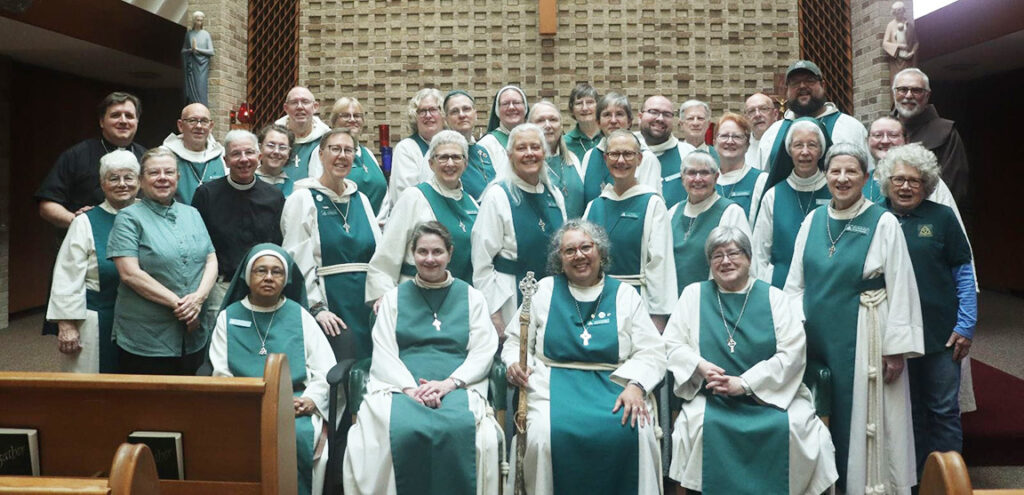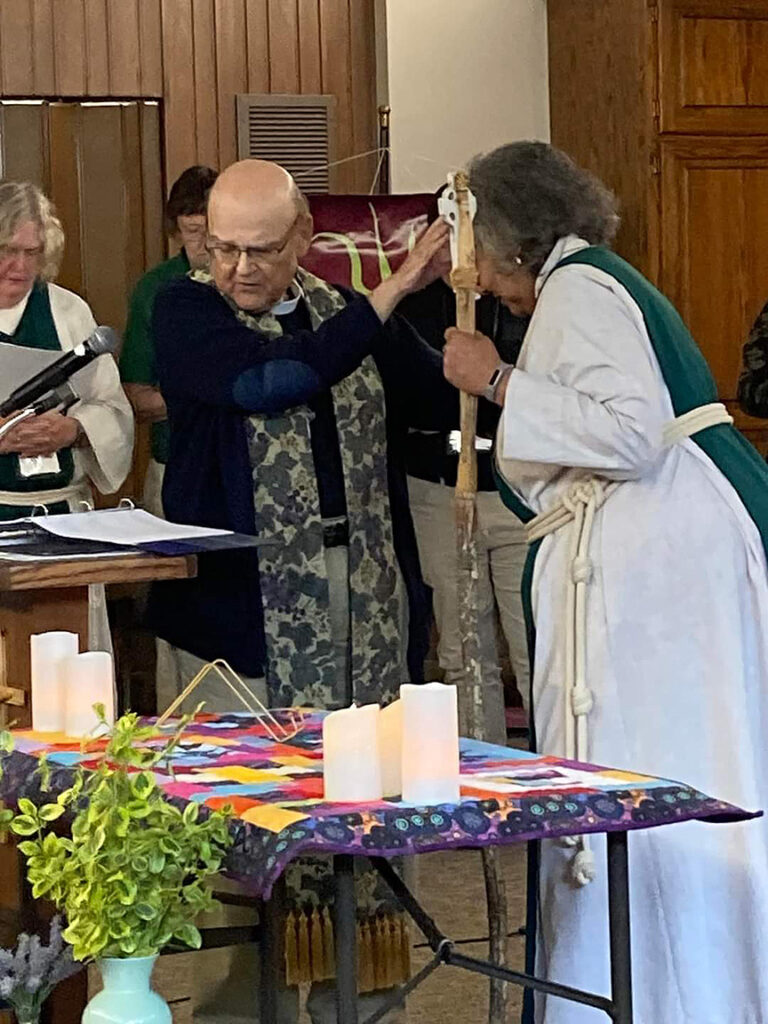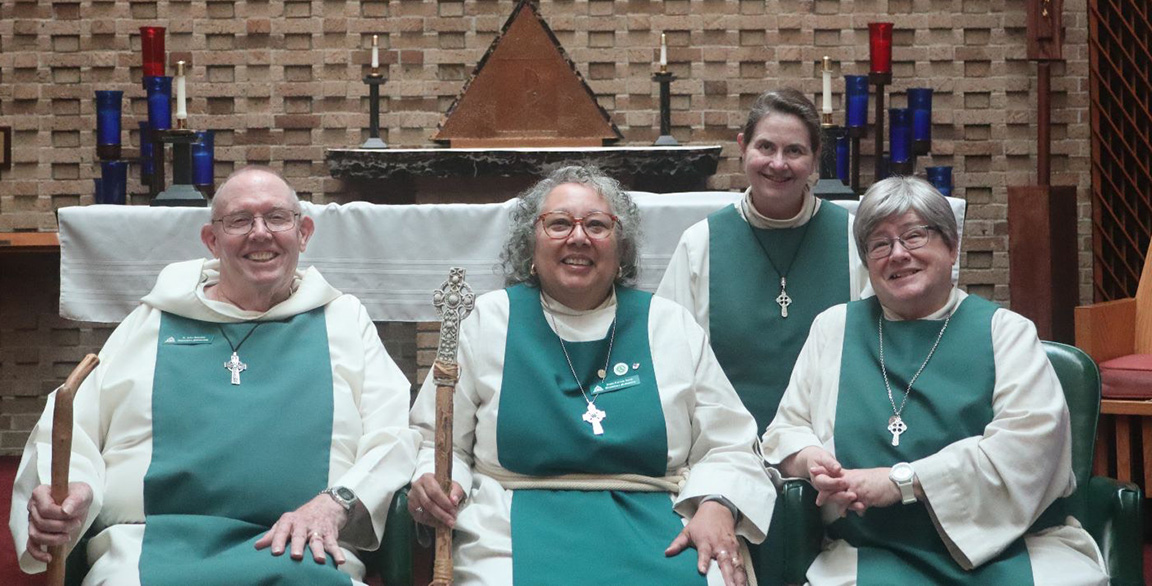
New Abbess Patricia Sarah Terry, front center right, and members of the Anamchara Fellowship gathered in Detroit at their June annual meeting. Photo: Sister BJ Brown
[The Episcopal News] Sister Patricia Sarah Terry had no sooner been installed as the fourth abbess of the Anamchara Fellowship than she took her duties to heart and got right to work, installing the monastic order’s next chaplain.
Terry, who previously chaired the Los Angeles diocese’s Bishop’s Commission on Gospel Justice and Community Care, was installed at a June 4 worship service during the group’s annual meeting, held in Detroit. The Anamchara Fellowship is a religious community within The Episcopal Church with a Celtic Christian spirit and with canonical recognition by the House of Bishops Committee on Religious Life.
Anamchara is a Gaelic word meaning “soul friend.” The 22-year-old Fellowship has about 70 members in the United States, Scotland and Brazil, and includes married, single, divorced, and partnered members, as well as clergy and laity.
Unlike many monastic orders, its members are “dispersed,” continuing to reside in their own homes rather than a centralized monastery. They pray together virtually, usually daily, and gather in person for an annual meeting, held June 3-9 this year at the St. Paul of the Cross Passionist Retreat Center, Terry told The Episcopal News in a recent telephone interview from Maryland, where she currently resides.

John Brendan, outgoing abbott of the fellowship, installs incoming Abbess Patricia Sarah Terry.
“I’m soaking in the weight of the trust that has been placed on me,” said Terry, who expressed amazement at her election. “There are so many people I admire in the Fellowship that I learn from every day. They’re just such a wonderful group of people.”
But for Fellowship co-founders Sister B.J. Brown and Sister Julian Wilson, Terry’s fourth ballot selection in an election that happened over several months, came as no surprise.
“She is a remarkably talented woman with a great deal of experience, not least in reconciliation and healing, which is one of her priorities for the Fellowship,” said Wilson.
“I’m eager to see where she’s going to lead us,” said Brown. “She functions out of a deep sense of her own connectedness to the Divine, to God, through Jesus. She lives Bishop Curry’s ‘if it’s not about love, it’s not about God.’ She really manifests that in her life. And I think she is going to be able to help bring us along with her; she’s a great encourager.”
Wilson agreed: “She is going to take us to new depths spiritually. We’ve talked for a long time about struggling with, how do you – especially in a dispersed community – how do you help somebody go deeper? I think she’s the one who will help us as a community, go deeper.”
And while that may sound like huge expectations, “I really view that she is finding her own giftedness and personality capable of cooperating with the Holy Spirit who will give her the gifts she needs.”
Nor was West Missouri bishop provisional and former Los Angeles Bishop Suffragan Diane Jardine Bruce surprised. “It is my great honor to serve as the bishop visitor for the Anamchara Fellowship,” Bruce said in a text to The News. “When I learned that Sister Patricia Sarah was elected as the new abbess, I was excited, not only for the Fellowship, but for Sister Patricia Sarah.
“I got to know her over the years in Los Angeles, and I’ve always been impressed with her wisdom, patience and grace. I look forward to working with her in this new role and the Fellowship!”
A leader in advocacy and action
Prior to relocating to Maryland, Terry was a member of St. Cross Church in Hermosa Beach. Under her guidance, the Bishop’s Commission on Gospel Justice and Community Care held informational and educational sessions, initiated a Mental Health First Aid training workshop for congregations across the diocese, sponsored a letter-writing campaign in support of HR1368, which would fund mental health first responders in crisis situations, and met with U.S. Rep. Katie Porter (D-Irvine), a sponsor of the bill.
Commission members also engaged local law enforcement, social activists and community leaders regarding policing. The commission was formed by Bishop John Harvey Taylor following the May 25, 2020, murder of George Floyd, which sparked worldwide protests and a national reckoning on police violence and systemic racism.
In appointing Terry as chair of the commission in 2021, L.A. Bishop John Harvey Taylor said “The Holy Spirit made it pretty clear, for a number of reasons, that the chair of our commission was Sister Patricia Sarah Terry, a person knowledgeable about the corridors of power in Washington, D.C., and an attorney, and a contemplative.”
Wilson said the order’s election process is to place all professed members on a ballot. The voting began in November and extended through mid-December 2023. The first person to receive 75% of the vote is elected abbess (or abbott), and that was Terry, who was selected from among some 35 others, she said.
“After the first vote, I considered dropping out, I just didn’t see it,” recalled Terry. She reconsidered, however, after consulting her spiritual director. “If I had dropped out, I would have been putting myself in place of the Holy Spirit,” she said simply. “That’s not what I was thinking at first. It wasn’t easy for me. There’s a time of real stretching and opening myself to this.”
Her first official act was to install the Rev. Jeff Austin Ross, rector of St. Peter’s Episcopal Church in Lewes, Delaware, as anamchara, or chaplain, to the order.

John Brendan, outgoing abbot, and Patricia Sarah Terry, incoming abbess, pose with Sisters Julian and BJ, founders of the fellowship. Photo: Sister AJ Brown
Terry, a retired attorney, grew up in the Catholic church in Chicago’s Hyde Park neighborhood but has said she’s felt Episcopalian at heart. She joined the Episcopal Church in 1982.
She began her career trying cases in civil court, before serving in the tax division of the U.S. Department of Justice, and later with the Internal Revenue Service, as Employee Plans Litigation Counsel nationwide, advising mostly about employee benefit litigation, she said. She has also worked for the Pension Benefit Guarantee Corporation as a senior level manager, “a step removed from the courtroom. I was more a mentor to other managers,” she said.
After a move to California, she went into private practice, but preferred helping people to the business aspects of her work. In 2012, she joined the Anamchara Fellowship as a companion, an external relationship of financial and spiritual support and adhering to a rule of life of prayer and service.
“The rule of life allows for the uniqueness of each one of us,” she said. “The idea is to be faithful to that rule of life, and to find our way consistent with that. Our vows require fidelity, obedience, generosity and hospitality.”
Although initially reserved about accepting this new role, Terry said she hopes to learn her responsibilities from members. “Each is unique and has something relational for me and me for them, and I’m learning that. During my three-year term I will not have learned everything I should have learned, but I will keep learning … and striving to continue to deserve their trust.”
